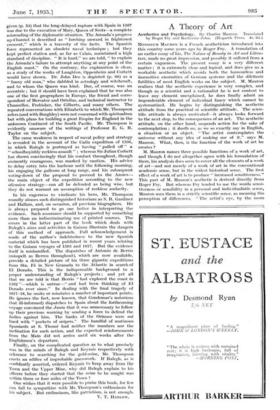Ralegh
IN the field of historical biography there are few careers that present so formidable a task to the writer as that of Sir Walter Ralegh. The wide range of his interests and the force of his personality were such that his biographer must be deeply versed in many matters if he is to achieve an adequate assessment. Great scholars, eminently fair-minded, have differed violently in their estimates of him. Happily, the personalities of the Tudor Age are being brought steadily into sharper focus by the unearthing and elucidation of new evidence ; and inter alia the true greatness of Ralegh, stripped alike of slander and misapplied encomiums, is gradually emerging.
Mr. Thompson has essayed the task of reinterpreting in popular form Sir Walter's career with the aid of the docu- mentary sources which have been made available since the days of Edwards and Stebbing. He has written a racy and extremely readable book, in which a mass of difficult material has been handled with great dramatic skill. But as history it is unreliable. A few examples of inaccuracy as regards historical " background " must suffice. The impression is
given (p. 54) that the long-delayed rupture with Spain in 1587 was due to the execution of Mary, Queen of Scots—a complete misreading of the diplomatic situation. The Armada's progress up-Channel is described as "lurching onward in frightened crescent," which is a travesty of the facts. The Spanish force represented an obsolete naval technique ; but they kept perfect station and, as far as Calais, maintained a high standard of discipline. "It is hard," we are told, "to explain the Armada's failure to attempt anything at any point of the English coast." On the contrary, the explanation is clear, as a study of the works of Laughton, Oppenheim and Corbett would have shown. Dr. John Dee is depicted (p. 68) as a "funny old man," wha dabbled in astrology and witchcraft, and to whom the Queen was kind. Dee, of course, was an eccentric ; but it should have been explained that he was also one of the first geographers in Europe, the friend and corre- spondent of Mercator and Ortelius, and technical instructor to Chancellor, Frobisher, the Gilberts, and many others. The repeated conversations with Elizabeth to which Mr. Thompson refers (and with Burghley) were not concerned with spiritualism but with plans for building a great Empire for England in the unknown Continent of the South Pacific. Mr. Thompson is evidently unaware of the writings of Professor E. G. R. Taylor on the subject.
The same weakness in respect of naval policy and strategy is revealed in the account of the Cadiz expedition of 1596, in which Ralegh is portrayed as having "pulled off" a " schoolboyishly reckless assault " ; whereas Sir Julian Corbett has shown convincingly that his conduct throughout, though eminently courageous, was marked by caution. His advice to delay entry into the harbour until the following morning, his engaging the galleons at long range, and his subsequent voting-down of the proposal to proceed to the Azores— the main object of the expedition according to the new offensive strategy—can all be defended as being wise, but they do not warrant an assumption of reckless audacity.
In his eagerness to vindicate his hero, Mr. Thompson roundly abuses such distinguished historians as S. R. Gardiner and Hallam, and, on occasion, all previous biographers. He is always prepared to go one better in interpreting the evidence. Such assurance should be supported by something more than an indiscriminating use of printed sources. The errors in the latter part of the book which deals with Ralegh's aims and activities in Guiana illustrate the dangers of this method of approach. Full acknowledgement is made of the author's indebtedness to the new Spanish material which has been published in recent years relating to the Guiana voyages of 1595 and 1617. But the evidence itself is mishandled. The dispatches of Antonio de Berrio (misspelt as Berreo throughout), which are now available, provide a detailed picture of his three gigantic expeditions from Sta. Fe in New Granada to the Atlantic in search of El Dorado. This is the indispensable background to a proper understanding of Ralegh's projects ; and yet all that we are told is that Berrio "had explored the coast in 1582 "—which is untrue—" and had been thinking of El Dorado ever since." In dealing with the final tragedy of 1617-18, he omits or misstates a number of important points. He ignores the fact, now known, that Gondomar's notorious (but ill-informed) dispatches to Spain about the forthcoming voyage convinced the Junta that it was unnecessary to follow up their previous warning by sending a force to defend the Indies against him. The banks of the Orinoco were not lined with "pockets of snipers." The handful of mutinous Spaniards at S. Thome had neither the numbers nor the inclination for such action, and the expected reinforcements from the Main did not arrive until six weeks after the Englishmen's departure.
Finally, on the complicated question as to what precisely was in the minds of Ralegh and Keymis respectively with reference to searching for the gold-mine, Mr. Thompson erects an edifice of improbable guesswork. If Ralegh, as is confidently asserted, ordered Keymis to keep away from the Town and the Upper Mine, why did Ralegh explain to his officers before they started that the mine to be sought was within three or four miles of the Town ?
One wishes that it were possible to praise this book, for few can fail to sympathize with Mr. Thompson's enthusiasm for his subject. .But enthusiasm, like patriotism, is not enough.
V. T. HARLOW.











































 Previous page
Previous page